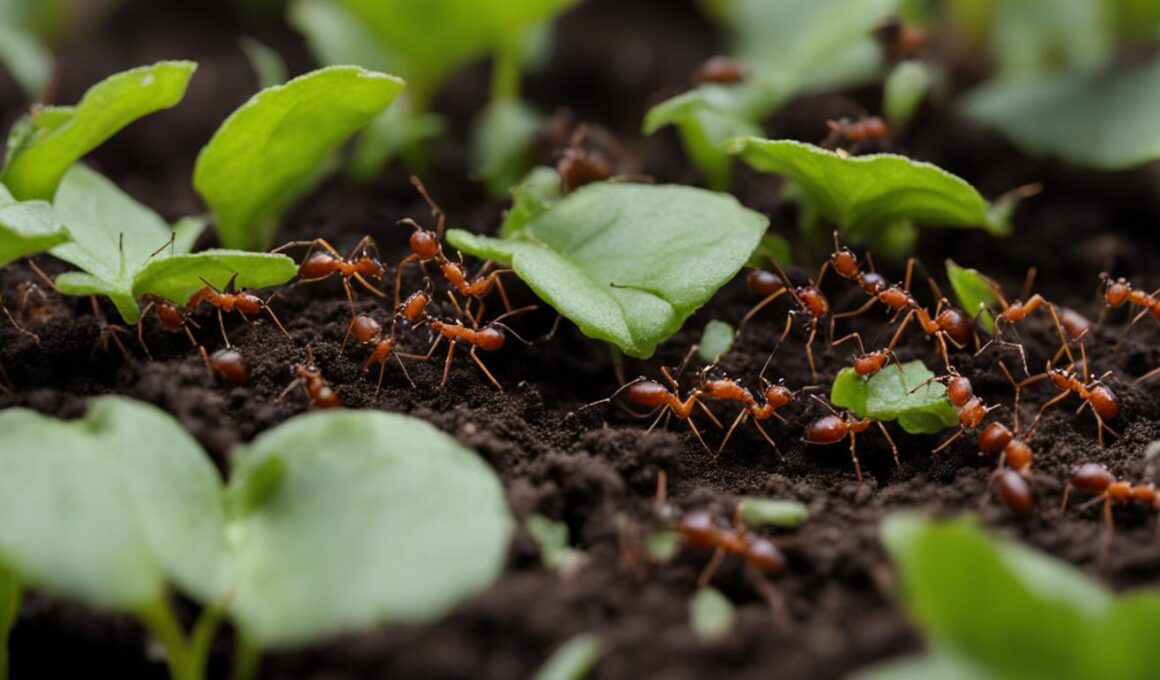Ants can play a dual role in your raised bed garden – beneficial or troublesome. While they contribute to soil aeration and pest control, they can also attract aphids and harm your plant roots. To determine if ants have become a problem in your garden, it’s essential to assess their population and behavior.
Key Takeaways
- Ants in your raised bed garden can provide benefits like soil aeration and pest control.
- However, ants can also attract aphids and cause damage to plant roots.
- Monitoring the ant population and their behavior is crucial to identify if they have become a problem.
- Consider natural methods to control ants in your raised bed garden, such as boiling water, nematodes, or citrus-based solutions.
- By maintaining a balance, you can enhance the overall health and productivity of your raised bed garden.
The Benefits of Garden Ants in Raised Bed Gardens
Garden ants offer several advantages in raised bed gardens. They play a crucial role in improving soil aeration and drainage, which are essential for the overall health and productivity of your garden. The tunnels they create as they burrow through the soil help to loosen compacted areas, allowing air and water to penetrate more effectively. This not only promotes root growth but also prevents waterlogging and reduces the risk of root rot.
Another benefit of garden ants is their ability to accelerate the breakdown of organic matter. As they scavenge for food, they disperse and fragment decomposing plant material, aiding in the decomposition process. This helps to release nutrients into the soil, making them more available to your plants.
Garden ants also act as natural predators, preying on harmful garden pests such as aphids. They feed on these pests and protect your plants from infestations, reducing the need for chemical pesticides. Additionally, ants can assist with pollination, especially for plants that rely on wind or self-pollination. Their movements and activity around flowers help to facilitate the transfer of pollen, promoting successful fertilization and fruit set.
| Benefits of Garden Ants in Raised Bed Gardens | |
|---|---|
| Improved soil aeration and drainage | Allows for better root growth and prevents waterlogging |
| Accelerated breakdown of organic matter | Releases nutrients into the soil for better plant growth |
| Natural pest control | Predation on harmful pests like aphids |
| Pollination assistance | Aids in the transfer of pollen for successful fertilization |
While garden ants offer these benefits, it’s important to note that their presence should be monitored. If the ant population becomes excessive, it can lead to potential disadvantages, such as attracting other pests or causing damage to plant roots. Maintaining a balance in your raised bed garden is key, ensuring that the benefits outweigh any potential drawbacks.
The Disadvantages of Garden Ants in Raised Bed Gardens
Garden ants can bring several disadvantages to your raised bed garden. While they offer benefits like soil aeration and pest control, they can also cause problems that affect your plants’ health and overall garden productivity. Here are the key disadvantages to be aware of:
- Increased Aphid Populations: One of the main drawbacks of garden ants is that they can attract and nurture aphids. Ants often protect aphids from their natural predators, leading to an infestation that can harm your plants.
- Attraction of Other Pests: Ants can also attract other pests to your garden, such as caterpillars and scale insects. These pests can cause substantial damage to your plants, leading to reduced yields or even plant death.
- Damage to Plant Roots: In their search for food and nesting materials, garden ants can disturb the roots of your plants. This disturbance can weaken the plants, making them more susceptible to diseases and nutrient deficiencies.
- Potential Stings or Bites: Certain species of garden ants, like fire ants, can sting or bite if they feel threatened. This can be a significant concern, especially if you have children or pets that spend time in your garden.
To maintain the health of your raised bed garden and mitigate these disadvantages, it’s essential to monitor the ant population and take appropriate action if it becomes excessive or problematic. By doing so, you can prevent further damage to your plants and ensure a thriving garden environment.
How To Control Ants in Your Raised Bed Garden
A raised bed garden can be a wonderful addition to your outdoor space, providing a convenient and productive way to grow your own vegetables and flowers. However, the presence of ants in your raised bed garden can sometimes become a nuisance. Fortunately, there are several effective methods to control ants and keep them from causing damage to your plants.
Using Natural Remedies
One of the simplest and most eco-friendly ways to control ants in your raised bed garden is to use natural remedies. For example, pouring boiling water over ant hills can be an effective way to eliminate ant colonies. The hot water scalds and kills the ants, disrupting their nests and preventing them from coming back.
Another natural method is to introduce beneficial nematodes to your raised bed garden. These microscopic organisms are natural predators of ants and can help keep the ant population in check. You can purchase beneficial nematodes online or at your local garden center and simply apply them to the soil according to the instructions.
Additionally, you can make your own ant control spray using orange peels or citrus-based solutions. Ants are repelled by the strong scent of citrus, so spraying these solutions around your plants or directly on ant trails can help deter them. Another option is to sprinkle diatomaceous earth around your raised bed garden. This natural substance is abrasive to insects but harmless to humans and can effectively control ants.
Creating Barriers and Using Bait
To further protect your raised bed garden from ants, you can create barriers using cinnamon. Ants dislike the strong smell of cinnamon and will avoid crossing it. Simply sprinkle cinnamon powder or place cinnamon sticks around the perimeter of your raised bed garden to create an ant-free zone.
If you prefer to use bait, you can try using aspartame or borax mixed with a sweet substance like sugar or honey. Ants are attracted to the sweetness but will be poisoned by the aspartame or borax. However, it’s important to use caution when using bait and keep it out of reach of children and pets.
By utilizing these natural methods, creating barriers, or using bait, you can effectively control ants in your raised bed garden and ensure the health and productivity of your plants. Remember to monitor the ant population regularly and take action when necessary to maintain a balanced and thriving garden environment.
| Method | Pros | Cons |
|---|---|---|
| Pouring boiling water | – Eco-friendly method – Effective in eliminating ant colonies |
– May harm beneficial insects – Requires caution to avoid burns |
| Introducing beneficial nematodes | – Natural predator of ants – Helps maintain ant population |
– Requires purchase of nematodes – May take time to see results |
| Using orange peel spray | – Easy to make at home – Deters ants with citrus scent |
– May need frequent reapplication – Not as effective for severe infestations |
| Sprinkling diatomaceous earth | – Natural and safe for plants – Controls a wide range of pests |
– Can be messy if not applied carefully – Harmful if inhaled, so use with caution |
| Creating barriers with cinnamon | – Natural and pleasant scent – Acts as a physical deterrent |
– Needs regular reapplication – May not be effective for all ant species |
| Using aspartame or borax bait | – Simple and inexpensive – Attracts and eliminates ants |
– Requires careful handling – May harm non-target organisms |
Can Bugs in Bagged Soil Also Be a Problem in Raised Bed Gardens?
When it comes to getting rid of bugs in bagged soil, you might be wondering if they can still be a problem in raised bed gardens. Well, the answer is yes. Bugs can reside in bagged soil and may find their way into your raised beds. It’s essential to inspect and treat the soil before adding it to your garden to prevent any unwanted pests.
Conclusion
In conclusion, garden ants play a dual role in raised bed gardens. On one hand, they offer numerous benefits such as improving soil aeration, aiding in pest control, and supporting pollination. These advantages contribute to the overall health and productivity of your garden.
However, it’s important to be aware of the potential disadvantages of garden ants. They can attract aphids, cause damage to plant roots, and even pose a threat with their stings or bites. Therefore, monitoring the ant population and taking appropriate action when necessary is crucial to maintain a balanced and thriving garden.
Fortunately, there are natural methods to control ants in your raised bed garden. From pouring boiling water over ant hills to using citrus-based solutions or diatomaceous earth, you have various options to choose from based on your preferences. By implementing these control methods, you can effectively manage the ant population without harming the overall ecosystem of your garden.
FAQ
How can I tell if ants are becoming a problem in my raised bed garden?
Look for signs like increased aphid populations, damage to plant roots, or excessive ant activity in and around your garden.
What are the benefits of garden ants in raised bed gardens?
Garden ants help improve soil aeration and drainage, accelerate organic matter breakdown, prey on harmful pests, aid in pollination, and support healthy ecosystems.
What are the disadvantages of garden ants in raised bed gardens?
Garden ants can attract aphids, damage plant roots, attract other pests, and potentially sting or bite.
How can I control ants in my raised bed garden?
You can try pouring boiling water over ant hills, introducing beneficial nematodes, using orange peel spray or citrus-based solutions, sprinkling diatomaceous earth, creating barriers with cinnamon, applying insecticidal soap, or using aspartame or borax as bait.
Are garden ants overall beneficial or detrimental to raised bed gardens?
Garden ants offer both benefits and disadvantages. They provide soil aeration, pest control, and pollination assistance, but they can also attract aphids, damage plant roots, and cause other issues. It’s important to monitor their population and take action when necessary.









